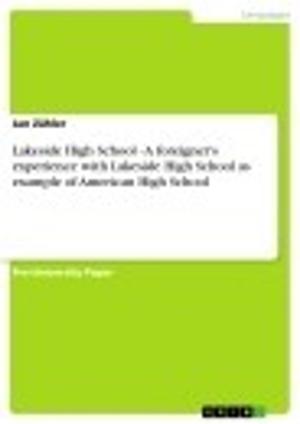How did media coverage affect the American involvement in and attitudes towards the Vietnam War?
The Media and the Vietnam War
Nonfiction, History, Americas, United States| Author: | Leila Fielding | ISBN: | 9783656293576 |
| Publisher: | GRIN Publishing | Publication: | October 19, 2012 |
| Imprint: | GRIN Publishing | Language: | English |
| Author: | Leila Fielding |
| ISBN: | 9783656293576 |
| Publisher: | GRIN Publishing |
| Publication: | October 19, 2012 |
| Imprint: | GRIN Publishing |
| Language: | English |
Essay from the year 2012 in the subject History - America, grade: 1:1 (First Class), , language: English, abstract: Of the surplus of myths which burgeoned from the carnage of Vietnam, perhaps none is more deceptive than the legend of an audacious, antagonistic mainstream media turning Americans against the war. In brief, two main factors characterise this debate. The first asserts that America lost the war due to damaging media coverage, particularly on television, which undermined political and military endeavours. The second affirms that the majority of journalists and reporters opposed the war, and their subsequent opinions polluted popular support for Vietnam. These suppositions have been reinforced by former correspondents like Robert Elegant, who, in 1981, argued that the outcome of war was 'determined not on the battlefield but on the printed page and, above all, on the television screen.' Neither of these widely accepted lines, however, can be convincingly verified. Many scholars now argue that the media in fact did not guide public opinion, but merely shadowed the ebb and flow of fluctuating social and political sentiment. Although there was some unfavourable press representation, which gained momentum as war raged on, it was inspired by a lack of perceptible confidence concerning Vietnam policy on the part of the administration and bolstered by a social view that Vietnam was an enduring conflict which had taken its toll on American lives and finances. The press, the most visible exponent of a society which appeared to have turned against Vietnam, became scapegoat, providing a convenient explanation for anti-war sentiment.
Essay from the year 2012 in the subject History - America, grade: 1:1 (First Class), , language: English, abstract: Of the surplus of myths which burgeoned from the carnage of Vietnam, perhaps none is more deceptive than the legend of an audacious, antagonistic mainstream media turning Americans against the war. In brief, two main factors characterise this debate. The first asserts that America lost the war due to damaging media coverage, particularly on television, which undermined political and military endeavours. The second affirms that the majority of journalists and reporters opposed the war, and their subsequent opinions polluted popular support for Vietnam. These suppositions have been reinforced by former correspondents like Robert Elegant, who, in 1981, argued that the outcome of war was 'determined not on the battlefield but on the printed page and, above all, on the television screen.' Neither of these widely accepted lines, however, can be convincingly verified. Many scholars now argue that the media in fact did not guide public opinion, but merely shadowed the ebb and flow of fluctuating social and political sentiment. Although there was some unfavourable press representation, which gained momentum as war raged on, it was inspired by a lack of perceptible confidence concerning Vietnam policy on the part of the administration and bolstered by a social view that Vietnam was an enduring conflict which had taken its toll on American lives and finances. The press, the most visible exponent of a society which appeared to have turned against Vietnam, became scapegoat, providing a convenient explanation for anti-war sentiment.















